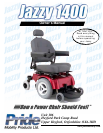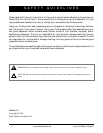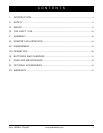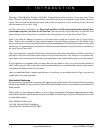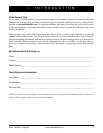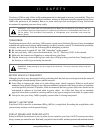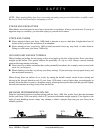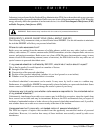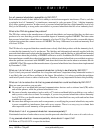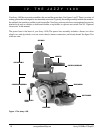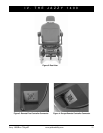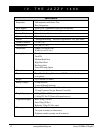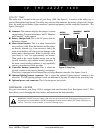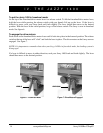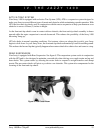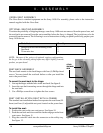
Jazzy 1400/Rev C/Sept02 www.pridemobility.com 9
III. EMI/RFI
Are all powered wheelchairs susceptible to EMI/RFI?
Each make and model of chair differs in its ability to resist electromagnetic interference. That is, each has
a particular level of “immunity” to interference, measured in volts per meter (V/m). A higher immunity
level offers greater protection. In other words, a powered wheelchair that has a high immunity level is less
likely to be affected by a strong radio source than is a powered wheelchair that has a low immunity level.
What is the FDA doing about the problem?
The FDA has written to the manufacturers of powered wheelchairs and requested that they test their new
products to be sure that they provide a reasonable degree of immunity against EMI/RFI. The letter states
that powered wheelchairs should have an immunity of at least 20 V/m. This provides a reasonable degree
of protection against the common sources of EMI/RFI. The Jazzy 1400 meets or exceeds an immunity level
of at least 20 V/m.
The FDA has also requested that these manufacturers clearly label their products with the immunity level,
or state that the immunity level is not known. The labeling and informational material supplied with the
powered wheelchair must explain what the immunity level means, and the labeling or informational material
must warn users about the possibility of EMI/RFI and how to avoid it. In addition, the FDA has recommended
that manufacturers establish an educational program to inform powered wheelchair users and their caregivers
about the problems associated with EMI/RFI, and about the actions that can be taken to minimize the risk
of EMI/RFI. The FDA requested that manufacturers of powered wheelchairs have these actions implemented
by December 2, 1994.
What can I do to find out if my powered wheelchair is likely to be affected by EMI/RFI?
If you’ve had your powered wheelchair for a long time and haven’t experienced any unintended motion, it
is not likely that you will have problems in the future. Nevertheless, it is always possible that problems
could arise if you are close to a source of radio waves. Therefore, it is very important to be alert to this possibility.
What can I do to reduce the risk that my powered wheelchair could be affected by EMI/RFI?
Here are some precautions you can take:
n Do not turn on or use hand-held personal communications devices such as citizens band (CB) radios
and cellular phones, while the powered wheelchair is on.
n Be aware of nearby transmitters (such as radio or TV stations and hand-held or mobile two-way radios)
and try not to come close to them. For example, if you are in a powered wheelchair with an immunity
level of 20 V/m, you should remain at least three feet from a hand-held two-way radio and ten feet from
a mobile two-way radio.
n Be aware that adding accessories and/or components, or modifying the powered wheelchair, may make
it more susceptible to interference from radio wave sources. There is no easy way to evaluate their
effect upon the overall immunity of the powered wheelchair.
What should I do if my powered wheelchair moves unexpectedly?
If unintended motion or brake release occurs, turn the powered wheelchair off as soon as it is safe to do so.
If my powered wheelchair moves unexpectedly, where should I report this?
Call Pride at (570) 655-5574 to report the incident.



